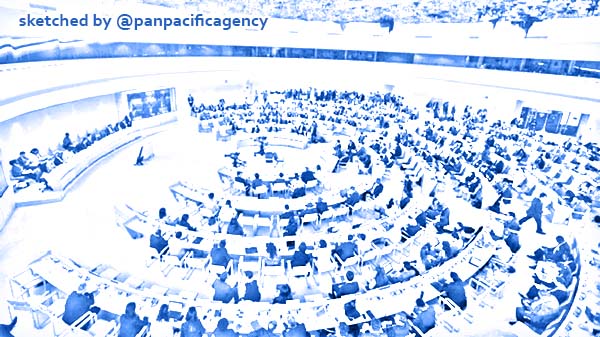[Analytics] Can China be removed from UN Security Council?

Overview of the United Nations Human Rights Council in Geneva, Switzerland (File Photo). Sketched by the Pan Pacific Agency.
Of late, most of those calling for China’s removal from the UNSC are Indians, clearly a result of the Chinese aggression at the Line of Actual Control (LAC) in Ladakh. Prabhash K Dutta specially for the India Today.
Type this question on Twitter and see the results that the micro-blogging site throws. Many are demanding this outcome since the coronavirus pandemic started killing thousands across the world. Of late, most of those calling for China’s removal from the UNSC are Indians, clearly a result of the Chinese aggression at the Line of Actual Control (LAC) in Ladakh.
An American Senator Ted Yoho of the ruling Republic Party espoused the view in May-end during a live TV interview. When an American citizen suggested that China should be held accountable for turning the coronavirus outbreak into a pandemic, Ted Yoho said, “That’s music to my ear.”
He went on to say, “The UN has no policing authority, no way to hold a member accountable and I think and your point is exactly what needs to happen. If the members of the Security Council don’t follow through on their commitments, they don’t need be on the Security Council. This is something we’ve talked to Secretary [Mike] Pompeo and other parts of the state departments and administration.”
But can China be actually removed from the UN Security Council, the most powerful body in the world?
The UN Charter did not conceive such a possibility. Chapter 5 of the UN Charter deals with the membership of the Security Council. It talks about the procedure for selecting the 10 non-permanent members of the UNSC. India recently became one for two years.
This means China or any other permanent member can be removed, or a new permanent member added to the Security Council only through an amendment of the UN Charter.
Chapter 18 of the UN Charter lays down the procedure for its amendment. It requires consent and ratification of two-thirds of the 193-member General Assembly. It must also have approval of all the five permanent members of the Security Council.
A combined reading of the two provisions makes it necessary that China approves its own sacking from the UNSC.
It is only theoretically possible given its stand – along with some other veto-power holders – on the question of reform of the Security Council to give seats to countries such as India, Germany and Japan. China will definitely use its veto against any move against it.
However, there is another possibility – a legal provision that saw Taiwan being thrown out and replaced by China in 1971. The UN General Assembly voted out Taiwan, which was till then represented in the global body as the Republic of China.
The civil war of China ended in the defeat of Kuomintang Party rule in 1949 and supremacy of the Communist Party of China, which controls the country even today. Two decades later, the UNGA voted to expel the Republic of China and admit the People’s Republic of China.
Taiwan held a seat on the Security Council and a veto. It passed on to China.
According to Article 6 in Chapter two of the UN Charter a member country can be expelled for persistent violation of the principles contained in the Charter.
China’s continued disregard for territorial sovereignty of other member countries since 1950s makes is a strong case for a punitive action against the country’s autocratic regime. But it has never been considered by world powers.
However, in the wake of the coronavirus pandemic, leaderships of several countries including the UNSC members such as the US and the UK have gone on record to call for fixing China’s accountability for the loss of lives and livelihood on the planet. Many believe this could be a strong case against China.
But can this happen?